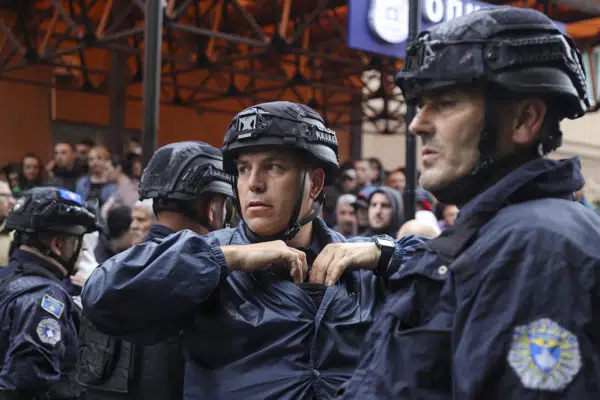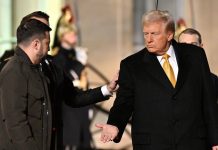Pristina, Kosovo (AP) – Serbia put troops on high alert at its Kosovo border after clashes broke out between ethnic Serbs and Kosovo police, injuring more than a dozen people on both sides.
The Kosovo conflict erupted in 1998, when separatist Albanians rebelled against Serbian rule and Serbia responded with brutal repression. About 13,000 people, mostly Albanians, died. The 1999 NATO military intervention eventually forced Serbia to withdraw from the territory. Washington and most EU countries recognize Kosovo as an independent state, but Serbia, Russia and China do not. Northern Kosovar Serbs, who make up the majority of the region, tried to block entrances to city buildings to prevent recently elected Albanian officials from entering the city buildings.
Currently, Police used tear gas and several cars were set ablaze. Following the clashes, Serbian President Aleksandar Vucic said his army was on “high alert”. Vucic also said he had ordered the Serbian army to be moved to the Kosovo border in an “urgent” manner.
Vucic will attend a rally in Belgrade in support of him following two mass shootings earlier this month that left 18 dead and 20 wounded. In a statement, he said Serbia was demanding NATO-led forces stationed in Kosovo to protect Serbs from Kosovar police, citing “violence” against Serbs in Kosovo.
The Kosovar police confirmed that they are increasing their presence in the north “to assist the mayors of the northern municipalities of Zvekan, Reposavić and Zvin Potok in exercising their right to work.”
Five police officers were injured by flash grenades and other hard objects thrown by demonstrators, police said. One patrol car was burned down and three others were damaged. Police also reported hearing gunshots.
Police used tear gas to disperse the crowd and let new officers into the office. Serbian hospital officials in Kosovo said about 10 demonstrators were injured. U.S. Ambassador to Kosovo Jeff Hovenia condemned the “ongoing actions by the Kosovar authorities to enter the city hall in northern Kosovo” and tweeted that “today’s violence should stop immediately”.
The new mayors of three ethnically Serb-majority municipalities in northern Kosovo were barred from entering buildings, while small groups of Serbs waved their hands at the municipal entrances. The Albanian website indexonline.net wrote that they were participating in the violence and posted a photo.
In Zvekán, the website Kosovo-online.com reported clashes with police in front of a public building, while in Leposavić the central square was also blocked with cars and trucks.
Earlier, Serbs had also sounded alarm sirens in four communities, including the northern capital of Mitrovica, as warning signals and calls to rallies, which police said were “used by criminal gangs to mobilize and rally.” It said it was a siren. The April 23 breakup elections were largely boycotted by the Serbs, with only Albanian or other ethnic minority representatives elected to the mayoral office and parliament.
Local elections were held in four Serb-majority municipalities in northern Kosovo after a Serb MP resigned last year in protest against the establishment of an association to coordinate education, health, land planning and economic development efforts at the local level.
Kosovar Albanians fear that unification could create new sub-states like Bosnia’s Republika Srpska, as Kosovo’s Serbs demand autonomy.
A 2013 agreement between Pristina and Belgrade on the plan was later ruled unconstitutional by the Constitutional Court of Kosovo, saying that the agreement did not include other ethnic groups and required the executive branch’s authority to enforce the law. It was decided that an exercise might be necessary.
The two countries have tentatively agreed to back the EU’s plans on how to proceed, but tensions remain simmering. The issue of union is one of the major issues facing Kosovo by both the United States and the European Union.
Worried that the Ukraine war could further destabilize Europe, the United States and the EU are stepping up efforts to resolve the Kosovo-Serbia conflict. The EU has made it clear to both Serbia and Kosovo that they need to normalize relations in order to proceed with their membership intentions.






